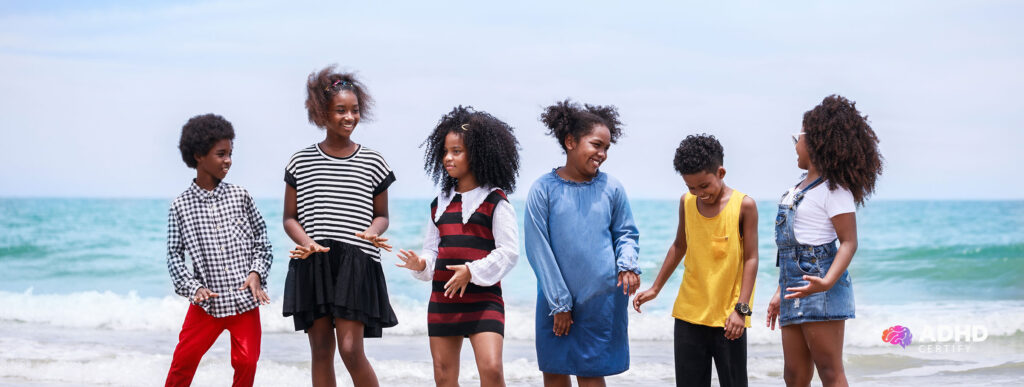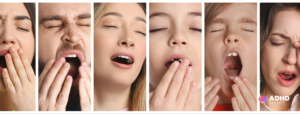Summer gatherings, barbecues, birthday parties, family reunions, can be thrilling for some children, but overwhelming for others. For children with ADHD, the noise, unpredictability and social expectations can quickly become too much. While other kids may settle into games or chats, children with ADHD may struggle with waiting their turn, following instructions, or managing big bursts of energy.
You might be wondering, “Why does my child find this so difficult?”
According to the NHS, children with ADHD may be easily distracted, find it hard to listen, interrupt conversations, and feel restless or struggle to sit still, all of which can make busy social settings more challenging (NHS, ADHD in children and young people).
With preparation and the right kind of support, however, children with ADHD can approach summer gatherings with more ease and confidence.
Why Summer Gatherings Can Be Difficult for Kids with ADHD
Understanding the common triggers of social overwhelm can help parents tailor strategies to their child’s specific needs.
Sensory Overload in Noisy or Unfamiliar Settings
Family barbecues, school fêtes, beach parties… they might look relaxed, but they’re often packed with noise, smells, movement, and unpredictable sensory input.
Children with ADHD can become overwhelmed when there’s too much happening at once. This isn’t just about volume. It’s about the brain struggling to filter out competing sights, sounds, and sensations.
A sudden pop of a balloon, unfamiliar voices, scratchy clothing, or a shift in lighting can all provoke distress or withdrawal.
Trouble Following Social Cues or Group Play Norms
Social situations often rely on subtle, unspoken rules: taking turns, sharing, sensing when someone has had enough.
For many ADHD kids, these cues aren’t intuitive. They might interrupt, speak too loudly, or miss shifts in tone. This can lead to misunderstandings or rejection.
It isn’t misbehaviour.
It’s often a mismatch between what the situation demands and how the child processes social information.
Impulsivity and Emotional Outbursts During Unstructured Time
Unstructured play can feel exciting to some children, but for those with ADHD, it may feel disorganised and overwhelming.
Without a clear structure or activity, they may blurt things out, move from game to game, or unintentionally break group rules. Emotional outbursts can happen quickly when overstimulation, frustration, or sensory overload builds up.
These aren’t tantrums. They’re signs the child is struggling to regulate under pressure.
Anxiety About Peer Interaction or Fear of Rejection
Some children with ADHD feel anxious before a social event, especially if past experiences involved being left out, teased, or misunderstood. They might cling, avoid eye contact, or refuse to attend. Others may arrive but keep to themselves. These behaviours aren’t laziness or attitude. They are often quiet self-protection after too many moments of feeling “too much” for others.
This anxiety can be heightened when children are being looked after by someone other than their primary caregiver. If they’re staying with a grandparent, family friend, or another parent during a gathering, they may feel unsure of the rules or less emotionally anchored. This can make it harder for them to relax, connect, or manage their impulses in the same way they might at home.
Preparing ADHD Children for Social Events
Preparation can reduce anxiety and help children feel more confident managing social dynamics.
Talk Through the Plan: People, Place, and Activities
Before the event, walk your child through what to expect.
- Who will be there?
- What kind of activities might happen?
- When will food be served?
ADHD brains thrive on predictability. Even a loose sense of structure can reduce anxiety and make the day feel more manageable.
Practise Greetings and Conversation Starters at Home
Many ADHD kids feel unsure how to start or join conversations. Practising basic social openers like “Hi, can I play too?” or “What are you building?” can build confidence.
You don’t need scripts, just small, low-pressure moments of play and modelling.
Roleplay Common Scenarios
Use roleplay to work through situations that might cause friction, like taking turns, sharing toys, or losing a game.
This helps children with ADHD rehearse self-regulation in a safe, playful setting, while giving you a chance to model coping strategies for emotional bumps.
Use Visual or Written Social Stories
Create simple visual guides showing what will happen at the event. Include things like who might be there, what noises to expect, and what your child can do if they need help.
These can be especially helpful for children who struggle with verbal processing.
Agree on a Quiet Zone or Signal for Breaks
Work together to identify a calm space they can retreat to if needed. Establish a subtle hand signal or code word in advance so they can ask for a break without feeling singled out.
In-the-Moment Support at Gatherings
During social events, small adjustments can make big differences in how supported a child feels.
If another adult is supervising, like a grandparent or family friend, they may not pick up on your child’s early stress signals in the same way you would. A quick check-in plan or agreed hand signal can help the child feel supported, even without you close by.
Stay Nearby but Avoid Hovering
Children with ADHD often benefit from a supportive adult within reach. Your presence can help prevent escalation, but too much intervention can feel stifling.
Strike a balance, available, but not watching their every move.
Redirect Gently During Overexcited Moments
When energy spikes, try redirecting rather than correcting.
Offer choices:
“Let’s help with the lemonade table”
or
“Want to race to that tree and back?”
Movement with purpose can calm the nervous system without conflict.
Offer Sensory Tools or Fidget Options
Some ADHD kids self-regulate best with something in their hands. A stress ball, a soft hairband, or chewy jewellery can help diffuse tension. Quiet, portable tools are ideal for group settings.
Validate Feelings and Offer Positive Feedback on Social Wins
Catch moments of growth. Praise things like taking turns, asking a friend to play, or stepping away before a meltdown. Specifically, encouraging feedback helps children feel seen, and builds motivation to keep trying.
Encourage Short Play Breaks if Needed
When things start to unravel, a five-minute breather can do wonders. Let them reset with a snack, a cuddle, or a walk. You’re not pulling them away from the fun. You’re giving them a way to stay in it longer.
Also, planning ahead with ADHD-friendly summer snacks can help avoid blood sugar dips that fuel meltdowns.
Encouraging Positive Peer Interactions
With support and encouragement, children with ADHD can build meaningful friendships and social confidence.
Arrange Smaller Group Playdates Before Larger Events
One-on-one or small group settings offer fewer distractions and more manageable social dynamics. These lower-stakes environments give ADHD kids a chance to practise conversation, turn-taking, and repair after misunderstandings, without the pressure of a crowd.
Match Children with Peers Who Share Their Interests
Children with ADHD often connect more easily when activities are structured around shared passions. Whether it’s LEGO, Pokémon, or outdoor games, common ground reduces social awkwardness and makes interaction feel natural rather than forced.
Support Sibling or Cousin Bonding as a Social Bridge
Familiar relationships can serve as anchors in chaotic environments. Encourage siblings or cousins to include your child in games or show them around.
These built-in allies can model behaviour and act as a bridge in ADHD and family gatherings.
Helping with Social Recovery After the Event
Social experiences can be emotionally and mentally draining; post-event support helps build resilience for next time.
Create Space for Down Time and Decompression
After a full day of social input, most children with ADHD need to reset. Good sleep hygiene plays a key role in this, especially during holidays when routines shift.
Support this with healthy bedtime routines for ADHD to help your child recover emotionally and physically after a long social day.
Talk About What Went Well (and What Was Tough)
Reflect together, without turning it into a lecture. Ask what they liked, what felt hard, and what they’d want to do differently next time.
Keep the tone curious and non-judgemental.
Validate Their Feelings Without Criticism
If your child is upset or withdrawn, let them know that’s okay.
Say things like, “That was a lot. I can see it felt hard,” to support emotional regulation without adding pressure. This also helps ease social anxiety ADHD child issues over time.
Keep Practising Social Skills Through Everyday Routines
Social learning doesn’t end when the party’s over. Practise conversation, sharing, and emotional regulation during daily routines like mealtime or playing at the park. Consistency builds confidence for the next big event.
Final Thoughts
Supporting social development in children with ADHD takes time, patience, and realistic expectations. It’s not about perfect behaviour or instant friendships. It’s about building trust, confidence, and small wins over time.
If your child continues to struggle with peer interaction, you may want to explore a formal ADHD assessment for children. Understanding your child’s unique profile can make everyday challenges feel less confusing and open the door to tailored support.
For some families, medication options can also be part of a wider plan that includes social coaching, school strategies, and emotional support.
Progress may be slow at times but every positive connection your child makes is a step forward.
Frequently Asked Questions
My child with ADHD often interrupts how can I help them in conversations?
Interrupting isn’t rudeness; it’s often impulsivity. Children with ADHD may struggle to hold onto thoughts without blurting them out. Practise turn-taking games, model waiting with visual cues (like holding a “talking token”), and praise even small moments of patience. Over time, this helps build awareness without shaming them.
Are group summer camps too overwhelming for children with ADHD?
It depends on the child. Some ADHD kids thrive in structured, interest-based camps with predictable routines. Others may feel overloaded by crowds, noise, and transitions. If you’re unsure, try shorter sessions or day programmes first, and speak with organisers about sensory or behavioural support.
What if my child says they don’t want to attend family events?
This might signal social anxiety or past experiences of feeling misunderstood. Acknowledge their feelings, and see if there’s a compromise, like arriving later, leaving early, or bringing a comfort item.
How can I explain ADHD-related behaviours to relatives who don’t understand?
Be clear, kind, and brief. “He finds it hard to wait his turn or sit still, especially when there’s a lot going on. It’s not bad behaviour, it’s how his brain works.”
Are social skills groups or therapists helpful for children with ADHD?
Yes, especially if the group is neurodiversity-aware and uses strength-based approaches. These settings can give children with ADHD space to practise interactions with guidance. Some families also benefit from parent training programmes that support communication at home.
How can we help siblings understand and support social struggles?
Use age-appropriate explanations like, “Your brother finds it harder to wait or stay calm. It’s not on purpose.” Encourage empathy but avoid turning siblings into referees. Shared routines, team-based games, or even reading books about ADHD peer relationships can foster connection without pressure.

Adam Carter
Author
Adam Carter is a neurodiversity advocate and experienced content writer for ADHD Certify. With a professional background in education and over a decade of personal experience living with ADHD, Adam writes with deep empathy and insight. He is passionate about creating content that resonates with others on similar journeys, offering clarity, encouragement, and hope. In his spare time, Adam enjoys cycling, gardening, and experimenting with new recipes in the kitchen.
All qualifications and professional experience mentioned above are genuine and verified by our editorial team. To respect the author's privacy, a pseudonym and image likeness are used.




